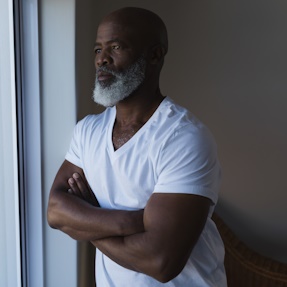
What to know about prostate cancer and Black men
Prostate cancer can affect any man with a prostate, but it is important to note that Black men have a 50% higher risk of developing prostate cancer during their lifetime and have twice the risk of succumbing to this disease compared to other races. Although the exact reasons for this increased risk are not yet fully understood, various factors could potentially contribute to it.
Why are Black men at greater risk for prostate cancer?
Various factors can increase a man’s risk of developing prostate cancer. These include race, age, family history, and smoking.
Many studies have found prostate cancer to develop prostate cancer to develop and be found more often in African American men and Caribbean men of African ancestry than men of other races.
Genetics play a crucial role in a higher percentage of prostate cancer among black men. However, lack of awareness and understanding of the disease, social barriers such as limited access to quality medical care, and racial disparities in healthcare also contribute to this increased risk. Unfortunately, research indicates that Black men are less likely to undergo prostate cancer screening than their white counterparts.
While it’s a known fact that Black men have a higher risk of developing prostate cancer, many are unaware of this correlation and don’t get screened regularly. This is an issue of concern that can be tackled through education. By raising awareness and providing information on the importance of screening, we can significantly reduce the number of cases. Therefore, it’s essential to keep educating people, especially those at high risk, to ensure they take preventative measures and protect their health.
Current guidelines for screening prostate cancer
It’s advised that men approach the topic of screening for prostate cancer with their healthcare provider at the age of 40. this includes Black men and especially, black men who have a family history of breast, ovarian, or prostate cancer should consider getting screened at age 40.
Screening tests for prostate cancer
The primary screening tools for prostate cancer are a digital rectal exam (DRE) and a PSA blood test. A DRE exam involves a quick check for lumps or inflammation in the prostate. The PSA blood test measures the amount of prostate-specific antigen in the blood. These are effective screening methods.
Why are Black men hesitant about prostate cancer screening?
There are several reasons why Black men may avoid or delay getting screened for prostate cancer. Some of the most common reasons include the stigma surrounding men’s health and disparities in access to healthcare for prostate cancer. Additionally, many African Americans have experienced negative interactions with the healthcare system, which can lead to mistrust and reluctance to seek medical care.
In African American culture, “cancer” is often associated with death, which leads Black men to avoid screening.
One of the cultural barriers to early detection of prostate cancer is that many patients only seek medical care when they experience symptoms. However, in the early stages, prostate cancer usually does not manifest any symptoms. As a consequence, most men do not prioritize screenings since they do not perceive the necessity of it, as they are not feeling unwell.
Family members role in encouraging loved ones to get screened
It’s crucial to talk about prostate cancer. In the African American community, people tend to avoid discussing anything below the waist. But loved ones, especially wives and daughters, should encourage men to prioritize their prostate health and get screened.
Encourage partners to nudge each other to get screened early and take the necessary steps to schedule and attend medical appointments together.
What else can be addressing this problem?
As a society, we need to address the issue of racial and health disparities that exist with respect to prostate cancer. It is important to eliminate these disparities and remove the stigma associated with this illness, particularly in African American men. We must encourage all Black men to make their health a priority and get screened regularly, as early detection through screening can make all the difference.
Prostate cancer is not a death sentence when caught early. Improved technology means better treatment options. Black men should participate in research to understand prostate cancer better.
Bottom line: Prostate cancer screening saves lives.
It is important to stay vigilant about prostate health if you are a male. Contact Dr. David B. Samadi, in Midtown Manhattan, New York City, a board-certified urologist and his expert team who specialize in diagnosing and treating prostate cancer.
Dr. David Samadi is the Director of Men’s Health and Urologic Oncology at St. Francis Hospital in Long Island. He’s a renowned and highly successful board certified Urologic Oncologist Expert and Robotic Surgeon in New York City, regarded as one of the leading prostate surgeons in the U.S., with a vast expertise in prostate cancer treatment and Robotic-Assisted Laparoscopic Prostatectomy. Dr. Samadi is a medical contributor to NewsMax TV and is also the author of The Ultimate MANual, Dr. Samadi’s Guide to Men’s Health and Wellness, available online both on Amazon and Barnes & Noble. Visit Dr. Samadi’s websites at robotic oncolo gy and prostate cancer 911.
